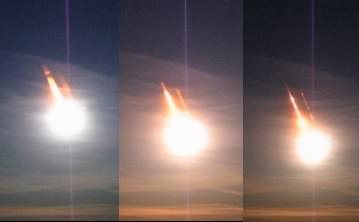[/caption]
Residents of Virginia in the US reported hearing booms and seeing flashes of light Sunday night, and originally, it was reported to be another possible meteor. But now officials from the U.S. Naval Observatory say it was likely the second stage of the Russian Soyuz rocket falling back to Earth. Parts of the rocket from last Thursday’s launch to the International Space Station would have fallen to Earth about that same time. “I’m pretty convinced that what these folks saw was the second stage of the Soyuz rocket that launched the crew up to the space station,” Space.com quoted Jeff Chester of the Naval Observatory in Washington, D.C.
Several people called 911 reporting streaks of light and loud booms, according to news reports. (Spaceweather.com has compiled several eyewitness accounts.)
Chester heard about the incident this morning and checked the listing for debris expected to enter the lower atmosphere during that time and found that second stage of the Soyuz rocket that launched last Thursday was re-enter Earth’s atmosphere during a window that started at 8 p.m. on March 29.
Chester ran a satellite tracking program that showed that the rocket debris should have come down exactly in the area where the fireball was spotted.
“This is just too much of a coincidence to be coincidence,” he said.
Chester said that U.S. Space Surveillance Network had not yet confirmed that this was the case, but said that he was “99 and four one-hundredths [percent] convinced that this is what it is.”
The descriptions of the boom and streak of light reported by local residents were “entirely consistent with re-entering space junk, especially something this big,” Chester said.
Space.com also reported that Delta airline pilot Bryce Debban reported seeing the streak of light on a flight from Boston to Raleigh-Durham when his plane was about 31,000 feet in the air.
The Soyuz rockets jettison their second stage after entering orbit in such a way that the second stage will slowly fall back to earth in a few days. But “you can control precisely where these things are going to come down,” Chester said.
It’s possible that some fragments of the rocket made it to the Earth’s surface, but they would likely have a couple of hundreds of miles east of Cape Hatteras, Chester said.
Source: Space.com


The USNO folks are wrong. The Russian rocket stage reentered March 29 over Taiwan. The East coast object was a bolide. At least one advanced amateur astronomer saw this object and reported a green trail.
The event must have looked impressive, I hope none falls too close to me lol
Hi Nancy, this one is getting some additional fireworks! Some are refuting the claim that the sky show was related to Soyuz (see my link). I wonder if the recent satellite crash hasn’t caused extra concern about space junk falling from the skies. What do you think?
It was General Motors, falling towards Washington from Detroit.
Spaceweather.com is saying the Soyuz fell near Taiwan, making this one a bolide.